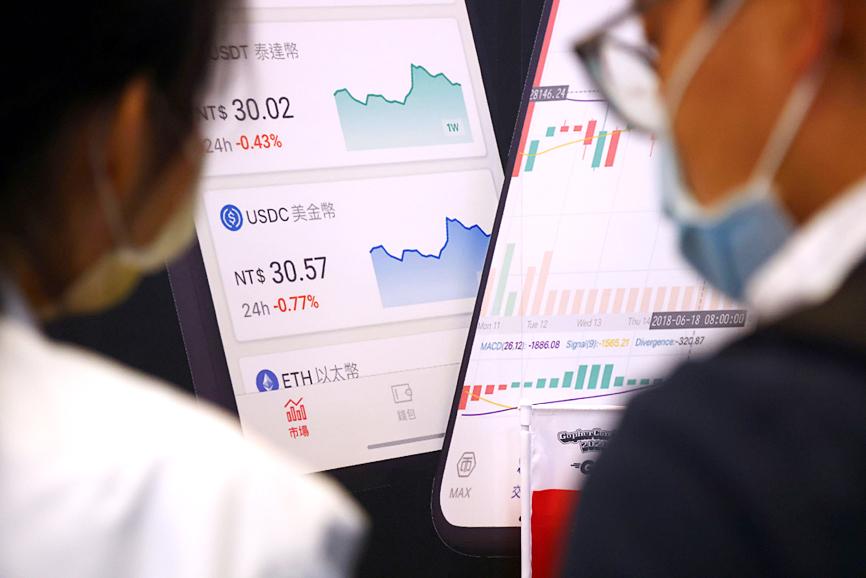Taiwan’s economy last quarter expanded 3.92 percent, surpassing an earlier forecast of 3.3 percent and prompting the Directorate-General of Budget, Accounting and Statistics (DGBAS) to steeply adjust its full-year growth forecast to 2.54 percent from 1.56 percent.
The expansion indicates a V-shaped recovery from a 0.58 percent decline in the second quarter due to the COVID-19 pandemic.
“Exports turned out much stronger than expected, with outbound shipments beating the agency’s estimate by US$6 billion in the third quarter,” Statistics Department head Tsai Yu-tai (蔡鈺泰) said.

Photo: Ann Wang, Reuters
Robust exports pushed up quarterly growth to the highest level since the second quarter of 2015, propelled by demand for 5G deployment, remote working and distance education, Tsai said.
Taiwan is home to the world’s largest contract makers of chips and electronics used in smartphones, notebook computers and data centers, allowing it to benefit from a crisis that has wreaked havoc on the global economy.
Outbound shipments this quarter might increase 7.75 percent year-on-year, as demand for new technology applications remains strong, the agency said.
Imports are expected to continue to decline by 1.65 percent, weighed down by cheap oil and the price of raw materials, although this effect is diminishing, it added.
Private consumption was disappointing, shrinking 1.48 percent, but easing from a 5.21 percent retreat three months earlier, it said.
Private investment has failed to meet expectations, with an expected annual pickup of 2.41 percent adjusted downward to 1.47 percent, Tsai said.
Consumer spending continued to take a hit from the pandemic, although the GDP component has greatly improved since the COVID-19 situation eased in May, he said.
Airlines saw passenger numbers in the third quarter slump 86.89 percent, while declines hovered at 10 percent for trains and other public transport, the agency said.
Private consumption might contract 2.52 percent for the year, deeper than an earlier forecast of 1.44 percent, it said.
The agency’s GDP growth forecast for next year was trimmed from 3.92 percent to 3.83 percent, after factoring in a higher comparison base this year and lingering effects of the pandemic.
The global economic outlook looks grim after European countries and US states shut down non-essential businesses to rein in COVID-19 cases, DGBAS Minister Chu Tzer-ming (朱澤民) said.
“Taiwan must stay alert,” Chu added.

Intelligence agents have recorded 510,000 instances of “controversial information” being spread online by the Chinese Communist Party (CCP) so far this year, the National Security Bureau (NSB) said in a report yesterday, as it warned of artificial intelligence (AI) being employed to generate destabilizing misinformation. The bureau submitted a written report to the Legislative Yuan in preparation for National Security Bureau Director-General Tsai Ming-yen’s (蔡明彥) appearance before the Foreign Affairs and National Defense Committee today. The CCP has been using cognitive warfare to divide Taiwanese society by commenting on controversial issues such as Taiwan Semiconductor Manufacturing Co’s (TSMC, 台積電) investments in the

INVESTIGATION: The case is the latest instance of a DPP figure being implicated in an espionage network accused of allegedly leaking information to Chinese intelligence Democratic Progressive Party (DPP) member Ho Jen-chieh (何仁傑) was detained and held incommunicado yesterday on suspicion of spying for China during his tenure as assistant to then-minister of foreign affairs Joseph Wu (吳釗燮). The Taipei District Prosecutors’ Office said Ho was implicated during its investigation into alleged spying activities by former Presidential Office consultant Wu Shang-yu (吳尚雨). Prosecutors said there is reason to believe Ho breached the National Security Act (國家安全法) by leaking classified Ministry of Foreign Affairs information to Chinese intelligence. Following interrogation, prosecutors petitioned the Taipei District Court to detain Ho, citing concerns over potential collusion or tampering of evidence. The

‘COMPREHENSIVE PLAN’: Lin Chia-lung said that the government was ready to talk about a variety of issues, including investment in and purchases from the US The National Stabilization Fund (NSF) yesterday announced that it would step in to staunch stock market losses for the ninth time in the nation’s history. An NSF board meeting, originally scheduled for Monday next week, was moved to yesterday after stocks plummeted in the wake of US President Donald Trump’s announcement of 32 percent tariffs on Taiwan on Wednesday last week. Board members voted to support the stock market with the NT$500 billion (US$15.15 billion) fund, with injections of funds to begin as soon as today. The NSF in 2000 injected NT$120 billion to stabilize stocks, the most ever. The lowest amount it

NEGOTIATIONS: Taiwan has good relations with Washington and the outlook for the negotiations looks promising, Minister of Economic Affairs J.W. Kuo said Taiwan’s GDP growth this year is expected to decrease by 0.43 to 1.61 percentage points due to the effects of US tariffs, National Development Council (NDC) Minister Paul Liu (劉鏡清) said at a meeting of the legislature’s Economics Committee in Taipei yesterday, citing a preliminary estimate by a private research institution. Taiwan’s economy would be significantly affected by the 32 percent “reciprocal” tariffs slapped by the US, which took effect yesterday, Liu said, adding that GDP growth could fall below 3 percent and potentially even dip below 2 percent to 1.53 percent this year. The council has commissioned another institution